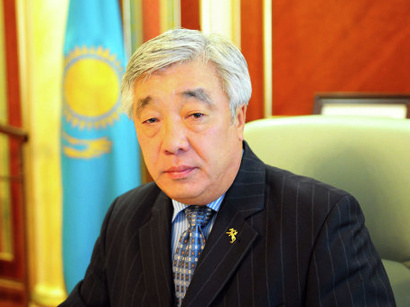There is no conspiracy behind EEU: minister

By Aynur Jafarova
Kazakh Foreign Minister Yerlan Idrisov has denied the claims about the similarity of the newly established Eurasian Economic Union (EEU) to the Soviet Union.
"Unlike those who claim that it is a secret plan of the Russian leader to revive the Soviet Union, I believe that the three leaders were clear in their statements, and they see a very different picture. No conspiracy, no theory behind these agreements, there are no hidden plans or thoughts," he said at a conference dedicated to the signing of the Treaty on the EEU.
Idrisov also noted there are several clear plans that will be implemented in this regard.
"There is a grain of truth, and it is very simple: not to stay on the periphery of global economic trends and become stronger in the face of the ongoing economic crisis. Moreover, it is necessary to improve the living standards of the population," the minister said.
The Kazakh Foreign Minister went on to add that the EEU is not a closed organization and has an open structure. The members of this organization (Russia, Kazakhstan and Belarus) welcome all opportunities for cooperation as well.
"This agreement will create better opportunities for further integration. Since the beginning, we accepted the principles of equality and transparency as the dominant principles of EEU," Idrisov said.
The minister also noted the member states have one-quarter of world's natural and 15 percent of world oil resources.
Kazakhstan, Belarus, and Russia signed an agreement on the establishment of the Eurasian Economic Union (EEU) in Astana on May 29.
The agreement consists of four large sections, includes about 1,000 pages, and contains 28 chapters, 118 articles and 32 applications.
The first article of the treaty specifies that the union is an international organization that focuses on regional integration.
EEU establishment not cause devaluation
In his remarks Idrisov also said the establishment of the EEU will not cause devaluation, but rather strengthen the national currencies of the member states.
"I don't believe there are grounds to think that the signing of this agreement will cause the devaluation of ruble, Tenge or the Belarusian currency. On the contrary, I'm confident that the enhancement of our economies will make our currencies stronger and more stable," Idrisov said.
He underscored that currency lives in an open world.
"Our currency lives in a world where other currencies and unstable markets exist," the minister said. "The countries' financial bodies will always work in close cooperation to overcome difficulties."
In February 2014, the Kazakh National Bank decided to devalue its Tenge currency by 19 percent to about 185 per dollar. In February 2009, the National Bank of the country weakened Tenge by 25 percent against dollar as well.
Chairman of Kazakh National Bank Kairat Kelimbetov also said there were no reasons for another devaluation of Kazakhstan's national currency Tenge. He noted the devaluation of Tenge is not expected.
